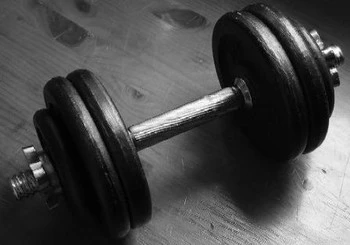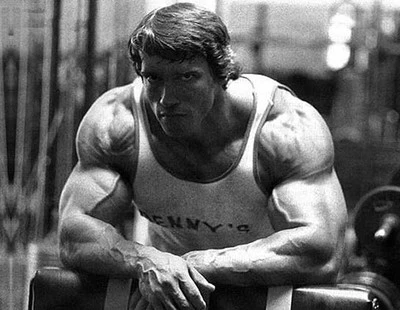
Trainer's Blog
Follow my blog for a constant stream of great fitness tips and information.

Follow my blog for a constant stream of great fitness tips and information.
 For starters, we're honest !
For starters, we're honest !What comes to mind when you think of steroids? Big, unnatural-looking muscles I’m sure. We all know Barry Bonds and Mark McGuire used steroids to hit farther than any other baseball players, and we know Arnold Schwarzenegger used steroids to get huge back in the day. Steroids are a dangerous and illegal substance, and yet, like pot, it seems like everyone has easy access to it if they want it. Just step into any “big box” gym and you’ll see humongous human beings walking around doing partner-assisted curls and crunches using a cable machine. Then they might jump on the leg extension machine and do a couple sets, and their legs will look like they are about to explode they’re so big.
Other non-steroid using gym members may see these guys training and think that they can mimic the results by doing the same exercises with the same reckless abandon. They may figure it out sooner or later but eventually, they’ll see that something vital is missing, because they’re not getting bigger or stronger, even though they’re doing the same things the huge guy is doing.
This is the frustration that many have felt over the years, and since most people don’t know how to train properly they think that the only way to make progress is through the use of steroids. It’s an unfortunate fact, but many believe they just can’t build muscle, that they’re bodies will just resist any attempt ...
 I’ve recommended total body workouts in pretty much all of my previous articles.
I’ve recommended total body workouts in pretty much all of my previous articles.
Now I want to add to that philosophy. Total body workouts certainly can get you great results if you do them consistently and work hard, but there is something else you could be doing to further improve your overall health and performance, and also your looks. It’s called conditioning work, and, according to the highly respected trainer of professional athletes and thousands of non-athletes, Christian Thibadueax, it is literally the key to achieving your body’s genetic potential.
Carrying around extra muscle mass is a full-time job for the body, and it has to feel able to survive with that added bulk. The body is remarkably good at surviving, and it has a survival mechanism that it can switch on if it feels the need. Such as if we are starving, the body will slow it’s metabolism and hold onto fat stores as long as possible while letting muscle get burned off, because the muscle requires more energy to maintain than the fat, so we’ll live longer if the muscle mass is diminished. The same goes for the opposite problem, if we are well fed and have extra muscle mass on our body, this demands lots of energy to maintain but also lots of endurance and strength to carry around all day long. Thus, if the body does not feel it has that strength and endurance to carry that extra muscle mass, it will slam on the brakes and not let us build...
 A Proactive Approach to Fitness Training
A Proactive Approach to Fitness TrainingMy father has always told me the same thing when it comes to money. He always said (in French), “Don’t spend less, make more”. My dad has always had a simple way to express how he feels about a subject – which is important. If you can’t sum it up in a few words, you’ve probably gotten too far away from the basics. His words are just another way of saying the old adage that we all know – the best defense is a good offense.
When it comes to fitness, the timid, worn out, reactive approach is exactly the wrong approach to take. Disagree? Tell me if this sounds familiar. You get some new workout clothes, you shovel out a few hundred bucks to join a gym (initiation, first and last month, towel upgrade, etc.), you get on a treadmill, you repeat the “get on a treadmill” part for another couple of weeks and then you never step foot in the gym again – that is until January rolls around again. You're problem isn’t that you're weak (mentally anyway), just ill-informed.
Without getting into all the things that make for an effective workout routine that you’ll stick to, I’ll get to the point of this article/blog. If what I described above is you, you’re training DEFENSIVLEY when you should be attacking the problem as AGGRESIVELY as you can - at your current capacity anyway.
The vast majority of people join gyms to accomplish one thing –...
 I hate to sound like a broken record, but it's weight-lifting.
I hate to sound like a broken record, but it's weight-lifting.Physical activity has been shown to prevent cognitive impairment in older adults. A research study was conducted at the University of Florida and published in the July 25 issue of the Archives of Internal Medicine. The study measured the daily activity levels of older adults and linked that to cognitive performance.
The study found that older adults who expend relatively high amounts of energy in their daily lives are substantially less likely to become cognitively impaired than those who exert less energy. The study states that, “The more energy spent, the lower the likelihood of cognitive impairment. Patients with the highest levels of energy expenditure were 90 percent less likely to become cognitively impaired than those with the lowest levels of expenditure.”
Kirk Erickson, Ph.D., an assistant professor in the department of psychology and the Center of Neural Basis of Cognition at the University of Pittsburgh, conducting studies of his own using imaging technology and found that one year of participation in modest amounts of exercise can reverse Alzheimer’s-related atrophy in parts of the brain involved in memory formation.
Now, the study participants were not specifically lifting weights as part of their physical activity. Their physical activity was more likely daily household tasks, walking around, gardening and just leading an active lifestyle. At Fast Twitch we...
 If this doesn't convince you......
If this doesn't convince you......So, I’ve made the argument for weight-lifting before, that it is the best way to look good while not taking up so much of your time that you become an anti-social recluse…but if that’s what you like to be, then recluse away. On the other hand, if you’d like to look and feel good, and, oh, I don’t know, have a life too, then here is an interesting study to attempt to bring you to the light.
In the book ‘The New Rules of Lifting’, by Lou Schuler, he talks about a study that was conducted between 1979 and 1997. The study followed 2,000 middle-aged men in the United Kingdom and it looked at their exercise patterns and physical activity. The results of the study were published in the journal ‘Heart’ in 2003 and found, among other things, that those who engaged in light to moderate physical activity (walking, gardening, playing golf, bowling) had no effect on heart disease, death from heart disease, or death from all causes, even if they did up to 90 minutes a day of those activities, they got no measurable protection from heart disease or any other terminal illness.
The ones who did get that protection were those who did “heavy” exercise (climbing stairs, playing vigorous start-stop sports like tennis, hiking, jogging, swimming, serious landscaping work). Also, they only needed to burn as little as 54 calories a day doing that heavy exercise.
If you weigh 150...
